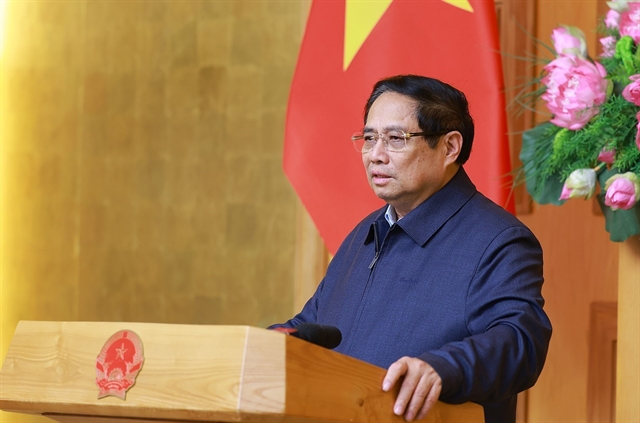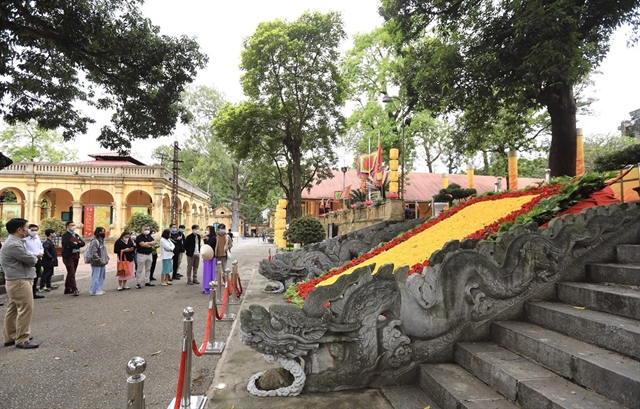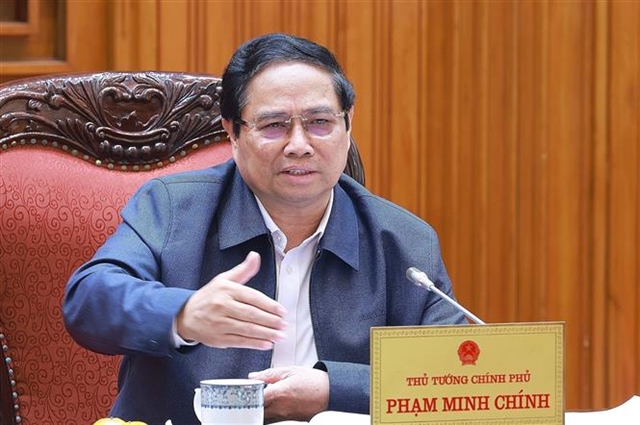 Politics & Law
Politics & Law

 |
| Prime Minister Phạm Minh Chính chairs the seventh session of the Government Steering Committee on the implementation of Resolution No 18-NQ/TW of the 12th Party Central Committee, which seeks to streamline the political system for greater efficiency and effectiveness. — VNA/VNS Photo |
HÀ NỘI — Prime Minister Phạm Minh Chính has instructed the selection of the most optimal plan for restructuring organisational apparatuses, to ensure a streamlined, efficient and effective system, while enhancing the quality of public officials and civil servants.
PM Chính made these remarks on Thursday while chairing the seventh session of the Government Steering Committee on the implementation of Resolution No 18-NQ/TW of the 12th Party Central Committee, which seeks to streamline the political system.
According to the committee, the restructuring of the political system’s organisational apparatus has been promptly implemented by ministries, ministerial-level agencies and government-affiliated agencies, with the basic completion of proposals.
It is projected that the Government’s organisational apparatus will be streamlined from 30 down to 21 units, including 13 ministries, four ministerial-level agencies, and four Government-affiliated agencies.
The ministries, ministerial-level agencies and Government-affiliated agencies have also been required to reorganise their internal apparatuses, linking this restructuring with personnel downsizing, restructuring and improving the quality of staff, officials and civil servants.
The projected reductions include 12 out of 13 general departments and equivalent units, 500 departments and equivalents under ministries and general departments, 177 departments under ministries and agencies and 190 public service units.
The committee has issued guidelines to the people’s committees of centrally-run cities and provinces to reorganise the political system’s apparatus at the local level, ensuring basic compliance with the set progress and requirements.
At the meeting, PM Chính, who is also head of the committee, requested the Ministry of Home Affairs, the standing agency of the committee, to gather opinions from its members to further refine the document before reporting to the Central Steering Committee and the Politburo.
The Prime Minister commended ministries and agencies for promptly advising the Government on issuing three decrees related to policies and benefits for officials, civil servants, public employees, workers and armed forces personnel during the restructuring. These policies also aim to attract and use talented individuals to work in Party, State and socio-political organisations.
Ministries, ministerial-level agencies, and Government-affiliated agencies were tasked with reviewing legal documents to amend and supplement regulations in line with the operation of agencies after organisational restructuring.
Draft decrees defining the functions, tasks and powers of ministries and agencies must also be submitted.
The Prime Minister emphasised that the restructuring of the organisational apparatus must adhere to the principles of being streamlined, efficient, effective and powerful. It should reduce intermediate steps and organisational units, eliminate overlapping functions and ensure no gaps in responsibilities or authority.
Additionally, the restructuring process should be in line with downsizing and improving the quality of civil servants and public employees, while addressing internal issues within agencies. It must safeguard the legitimate rights and interests of officials, civil servants, public employees and workers.
PM Chính also called for the prompt submission of a Government decree on public asset management to address issues related to public assets during the restructuring process.
Regarding the merger or dissolution of certain agencies or units where differing opinions remain, PM Chính requested the preparation of comprehensive dossiers for submission to competent authorities. Any unresolved issues should continue to be studied, with suitable options presented.
For restructuring State-owned economic groups and corporations, the Prime Minister urged the review of successful models, best practices and effective approaches to identify the most optimal plan.
He emphasised that Government- or ministry-affiliated units must be assigned responsibilities and equipped with management tools, including legal frameworks, mechanisms, policies and monitoring tools. More authority should be granted to boards of members.
The Government should directly manage only a few strategic corporations that serve as core pillars of the national economy and function as tools for macro-economic regulation. Other groups and corporations should be transferred to ministry-level management. — VNS




